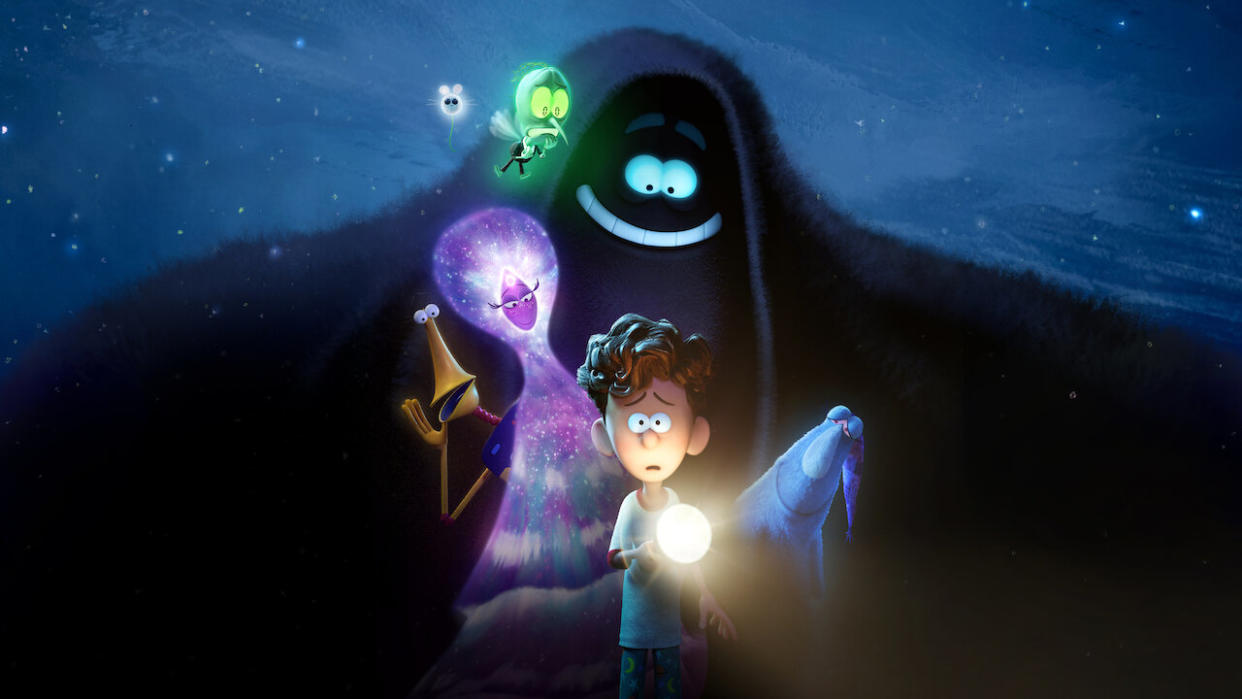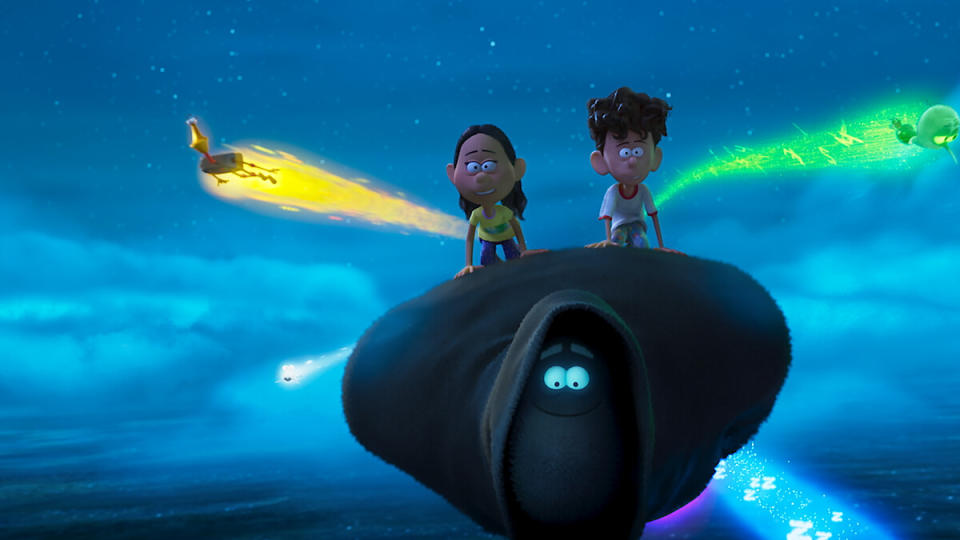‘Orion and the Dark’ Review: Charlie Kaufman Wrote an Animated Kids Movie for Netflix, and the Final Product Is Almost as Good as That Sounds

Charlie Kaufman isn’t one to half-ass things or lend his name to projects that don’t reflect the full volume of his voice as a writer, but I was admittedly skeptical of his screenplay credit on Netflix’s “Orion and the Dark,” an animated kids movie adapted from Emma Yarlett’s picture book of the same name and directed by Sean Charmatz, whose most notable work includes a pair of “Trolls” shorts and a job as “head of story” on “The Angry Birds Movie 2.”
On the one hand, this is the first time since “Eternal Sunshine of the Spotless Mind” that Kaufman has been credited for writing a film that he didn’t direct himself. On the other hand, it’s hard to put much faith in credits on a streaming platform that doesn’t even let you watch them, and — beloved as Yarlett’s book might be — this project seemed like precisely the kind of content slop whose producers would regard Kaufman’s imprint as less of a feature than a bug. A Netflix movie like this doesn’t have to be special, it just has to distract kids from watching “Bluey.”
More from IndieWire
Anyway, “Orion and the Dark” opens with its 11-year-old hero (Jacob Tremblay, duh) pacing around his elementary school and rehearsing how to say hi to the girl he likes as his internal monologue frantically obsesses over every negative thing that could possibly happen, an anxiety that stems from Orion’s deep-seated preoccupation with the eternal nothingness of death (the one thing his overactive mind struggles to imagine). As a result of that preoccupation, this neurotic little boy has become so afraid of life that he can’t even flush a toilet without fearing that it might flood the sixth-grade bathroom, or turn in a permission slip without catastrophizing how a simple field trip might trigger a chain reaction that leads to the end of his family’s bloodline. And when Orion is confronted by the living manifestation of darkness (his single greatest fear), the ancient night entity introduces himself with a short film — narrated by Werner Herzog — that he ruefully notes was rejected from Sundance.
We can’t know to what (if any) extent Kaufman’s final draft was diluted by the Kafka-esque process of bringing studio animation from script to screen, but it’s safe to say that his signature touch hasn’t been lost in translation. And that touch extends far beyond the stuff of basic character details and unusually sharp versions of the in-jokes that movies like this often lob at the parents who are watching along with their children. “Orion and the Dark” takes the clever wisp of a bedtime story provided by its source material and stretches it into a self-aware and sweetly multi-generational meditation on how beautiful the world can be if you learn to live with your fears.
Kaufman may not have been granted quite the same latitude that Netflix gave him with “I’m Thinking of Ending Things,” as this is still pretty straightforward American kids fare at the end of the day (complete with edgeless character designs and the kind of manic pacing that leaves you a little exhausted by the start of the third act). But then again, it’s possible he didn’t feel compelled to ask for it.
If “Orion and the Dark” is in some respects a major outlier in Kaufman’s body of work, there’s still no getting around the fact that he was just the right fit for the job; few screenwriters have found such inventive ways to torture their characters with their own neuroses, and even fewer have done so in a way that can make those neuroses feel like blessings in disguise. When Orion says that he’s afraid of the dark, you believe it. And when he inevitably learns to work with his fears instead of running away from them, you believe that too.
It turns out that the Dark is a pretty nice guy. Voiced by Paul Walter Hauser (who gives a warm and textured performance while also sounding uncannily similar to Seth Rogen), Dark is just a misunderstood softy who can’t stand the idea that people have been scared of him for so many thousands of years. But when Dark steps out of the shadows in the corner of Orion’s bedroom one night, it’s not part of some publicity tour to change the hearts and minds of all the world’s children — Dark reveals himself to Orion because he simply can’t stand how annoying it is to hear that kid tremble under the covers every night. And so, for the sake of his own sanity, Dark invites Orion to tag along for a shift and see how the sausage gets made. It’s an offer our hero literally can’t refuse, as Dark launches him out of the boy’s house in the New York suburbs and up into the sky, where they’ll spend most of the movie looking down at the world from above as they zoom across the planet with the sunrise nipping at their heels.
Do ancient night entities have heels? It’s hard to say. Dark is a hunched and hooded giant whose black cloak stretches from his head down to his toes, enveloping him in an inexpressive sameness that focuses our attention on his glow-in-the-dark mouth and eyes; those eyes, like everyone else’s in this movie, are cutely stuck together, which should help to ensure that Orion is more afraid of the Dark than your kids will be. All the same, it doesn’t take Orion very long to pivot from terror to panic, with a pinch of skeptical confusion thrown in for good measure. Orion understandably freaks out about the fact that he won’t be able to return home until Dark completes his night flight around the globe, but that whole premise bumps up against his defiant awareness that dark is just the absence of light, and not “a stupid cartoon character.”

Kaufman characteristically makes the most of that familiar disconnect between logic and emotion, as his script identifies that abyssal gap as the source of the best and most frightening stories we tell ourselves about the world. It turns out that “Orion and the Dark” is one of them — a story that an adult Orion (Colin Hanks) is actually telling to his daughter in order to help her go to sleep one night. Not only does that device help contextualize Orion’s childhood as a natural part of life, it also invites this movie to embrace the “make it up as you go” energy of a bedtime tale, and even comment on itself as it goes along.
Charmatz’s nimble direction allows the action to flitter between the imagined past and the “actual” present without missing a beat, and that deftness proves key to the Pete Docter-like anthropomorphism that renders the Dark and his colleagues as working stiffs with a job to do (not unlike the dad who’s telling this story, and needs to get his daughter to sleep so that he can do his own job the next day).
Kids will delight in the colorful, “Inside Out”-coded ensemble cast that Dark introduces to Orion, even if the long scenes where these characters explain their roles to us can veer too close to the kind of blandly instructional world-building that American animation often mistakes for plot. The other night entities include Unexplained Noises (Golda Rosheuvel as a cacophonous brass kook that clatters every time it moves), Insomnia (Nat Faxon as a little green alien-looking guy with alarm clocks for eyeballs), Quiet (a cute and squishy mouse sprite played by Aparna Nancherla), and Angela Bassett — who else — as the purple, silkily voiced Sweet Dreams.
These ancient forces all have a part to play in the daily story of our planet, and seeing how they all work in concert with each other is as reassuring as listening to someone talk you through the physics of flying and the redundancies built into an airplane. It’s not always a lot more fun than that, but clever sight gags and stimuli overload keep things moving along, even if the contrived tension that develops between Dark and his friends — who resent that Light (Ike Barinholtz) gets all the glory, and eventually decide they also want to be seen and heard — is just reverse-engineered from this story’s need to affirm that night has its bright spots.
After all, it’s only because of the dark that we’re able to see the stars. And as “Orion and the Dark” emerges from the mild tedium of its second act and into the lightly time-bending, gently heart-melting cohesion of its final chapters, that astronomical truth expands to illuminate how it’s only because of our fears that we’re able to see the world shining around them.
Grade: B
“Orion and the Dark” will be available to stream on Netflix starting Friday, February 2.
Best of IndieWire
Sign up for Indiewire's Newsletter. For the latest news, follow us on Facebook, Twitter, and Instagram.

 Yahoo News
Yahoo News 
